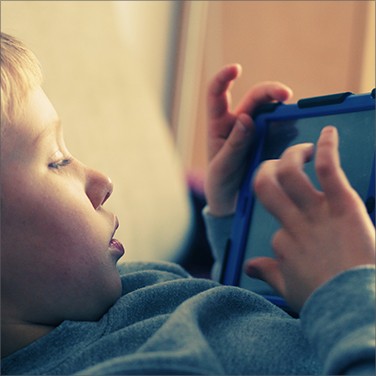Screen Time Before Bed has Greater Effect on Teens and Children
By Christina Phillis
Children and teens are some of the most proficient and frequent users of smartphones and computers. And, according to a new study, these age groups are also the most vulnerable to the sleep-disrupting effects of screen time. In 90 percent of the studies involving youths aged five to 17, researchers found that more screen time is associated with delayed bedtimes, fewer hours of sleep and poorer sleep quality.
“The vast majority of studies find that kids and teens who consume more screen-based media are more likely to experience sleep disruption,” said first author Monique LeBourgeois, an associate professor in the Department of Integrative Physiology at the University of Colorado Boulder. “With this paper, we wanted to go one step further by reviewing the studies that also point to the reasons why digital media adversely affects sleep.”
How Screens Affect Us
It appears that the amount of screen time is not the only factor to consider. One study found that melatonin levels fell twice as much in children than in adults when they were exposed to the same amount and intensity of light. Researchers theorize that light has a greater impact on the internal body clocks of children because their eyes are not fully developed. When light hits the retina, it suppresses the sleep-promoting hormone melatonin, which delays the readiness to sleep and pushes back the body clock. “Light is our brain clock’s primary timekeeper,” said LeBourgeois. “We know younger individuals have larger pupils, and their lenses are more transparent, so their exposure and sensitivity to that light is even greater than in older individuals.” Certain studies found that blue light, the part of the spectrum that is emitted by most hand-held electronics, is especially effective at suppressing melatonin. And the mental stimulation of the media being consumed — no matter the type of content — can arouse cognitive function, which also delays sleep. Even just having a phone or computer in their bedrooms overnight significantly affects the sleep habits of children and adolescents.
How Much is Too Much?
Commonsense Media reported that mobile media usage among young children has tripled since 2011. Researchers have also noted that the digital media landscape is evolving rapidly and that answering even the most basic of questions requires more study. In new research launched by LeBourgeois, researchers will visit the homes of volunteer families to observe how exposure of children to varying intensities of light changes the melatonin levels and the timing of their biological clocks. In an effort to develop science-based guidelines for parents and device makers, they hope to learn exactly the amount of light that it takes to affect circadian rhythms in young children.
